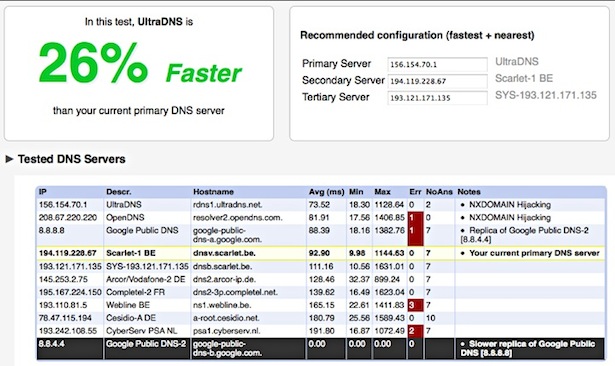Did you wonder how your computer and browser connects to a specific server on the Internet only by giving it a human readable address, like www.google.com? There is an important link in the chain of connectivity between your computer/table/laptop/smartphone and servers on the net which is called DNS: Domain Name System.
By default the IP address of the DNS server used by your connection is set most of the time automatically by your computer, which queries this data directly from your Internet provider.
Is the pi using a DNS forwarder or hitting the root servers directly? If you're all about speed, then you could setup the pi to forward requests to the fastest performing dns server on the benchmark. Then you would get the benefit of that server's cached entries. GRC’s DNS Benchmark. GRC’s DNS benchmark is another great tool for checking on the speed of DNS servers. It’s lightweight when compared to Namebench as it is only 164KB whereas Namebench is 5MB. DNS benchmark will help you test up to 200 publicly available DNS server as well as those servers that are currently in use by your machine. DNS Benchmark bundled with a list of all popular public DNS servers and automatically includes the DNS servers that are being used by host system. In addition host also has the option of manually adding any DNS server benchmark. DNS Benchmarking: In addition to determining the spoofability of your DNS nameservers, GRC's free “DNS Benchmark” utility can test, compare and rank the name resolution performance of any DNS nameservers accessible to you. In order for us to do the benchmark, we will be needing a Windows-based computer to run our software. DNS Benchmark Software. We will be using the DNS benchmark software by GRC. This one in particular allows us to conduct an analysis of our DNS servers, how they behave, and whether any particular issues may arise such as potential security holes.
ChrisPC DNS Switch Pro continues the series of connectivity tools that are useful for a safe and anonymous Internet browsing. This tool makes DNS change more easy and faster giving you a series of options like choosing from preset groups of DNS servers the one that fits your browsing habits.
The new Version 4.00 brings a powerful feature called DNS Benchmark, that will let you easily find the fastest DNS. Also it comes with full support for the upcoming Windows 10 operating system.
ChrisPC DNS Switch provides you a simple but effective graphic user interface to select the network adapter/card and change its corresponding DNS with the selected DNS from the preset lists or with a custom DNS. Features are diverse and give you the possibility to maintain your DNS database.

The software will make your life easier: You may want to protect your anonymity in which case you can select a server from the Anonymous DNS preset group list. Or you may choose to use Secure DNS servers that filter out websites that are potential threats to your PC (avoiding viruses, malware, trojans etc).
Furthermore with your children browsing the internet you might choose to switch to a Family Safe DNS server to steer clear of harmful websites like adult ones, or those that encourage violence, drugs and/or indecent behavior. In the end it might be that you just want a faster DNS than the one your internet provider has, in which case you might use one of the Regular DNS preset group or one from your Custom DNS group
By having all these preset groups of servers in its DNS database, ChrisPC DNS Switch offers you the freedom to conveniently manage your DNS settings for all the network adapters belonging to your PC/laptop running Windows.
Being a completely free software for non-commercial use, ChrisPC DNS Switch is one of the best options on the market today to handle DNS management for those who care about their connectivity settings and are not satisfied with their default DNS server connection settings.
Therefore we invite you to go for it, download it from our page and start using it on a daily basis. You will be impressed!
Licensing
ChrisPC DNS Switch comes in 2 flavors: a Pro version and a Free version.
ChrisPC DNS Switch Pro is a shareware software having a 14 day free trial period. During the trial period there are certain limitations. To benefit from the full power of this software you need to purchase a license. More details about purchasing can be found here.
ChrisPC DNS Switch is a freeware software for non-commercial use.
To find out the differences between the two versions, check the feature comparison page.
Features
ChrisPC DNS Switch has many key features like:
- Change your computer DNS with just 1 click.
- Set your favorite DNS or select one from the software's DNS Database.
- The DNS Database contains presets grouped by type: Regular DNS, Secure DNS, Family Safe DNS, Anonymous DNS and Custom DNS.
- DNS Benchmark lets you find the fastest DNS with one click.
- Protect your online experience by using a Secure DNS server that filters out websites that are potentially threats to your PC (avoiding viruses, malware, trojans etc.)
- Block adult websites or those that encourage violence, drugs and/or indecent behavior by selecting a Family Safe DNS.
- Import DNS server lists from text file.
- Improve your privacy while you surf the internet by using an Anonymous DNS.
- Gain access to websites that are blocked or restricted in your country/area using a Regular or Anonymous DNS.
- Saves your initial DNS settings so you can safely restore them back at any time.
- Easy add and edit your own DNS address in the Custom DNS preset list.
- Fast Switch your DNS from systray popup menu.
- Multi language interface: English, Romanian.
- Launch software on Windows boot.
- Minimize ChrisPC DNS Switch to systray.
What are the System Requirements ?
Hardware:- 1000 MHz processor or higher, such as an Intel Pentium III or AMD Athlon
- Memory : more than 128 MB RAM
- HDD Space : 10 MB
- Network adapter
- Microsoft Windows 8, 7, Vista, XP & Windows Server 2012, 2008, 2003. 32-BIT/64-BIT ready
What exactly is DNS ?
The Domain Name System (DNS) is a hierarchical distributed naming system for computers, services, or any resource connected to the Internet or a private network.
Simplifying DNS mechanism one can say that DNS is an intelligent phonebook where network entities (computers, servers, printers etc) have a human readable name associated with their technical unique Internet address which is a sequence of numbers.
In the end, computers connect to each other on the network by their technical internet addresses called IPs: IP (v4) or IP (v6).
Dns Benchmark Tool

Dns Benchmark Tls
A DNS server has the capability to quickly serve the IP of the named computer/entity that is accessed from your PC/laptop/tablet/smartphone. Therefore it is necessary for the functioning of your Internet browser when using URLs (Uniformed Resource Locators) and also when you send emails, since you use email addresses (which are in human readable form). Hence DNS is vital for browsing on the Net.Dns Benchmark Iphone
A lot of the DNS services normally advertise on their fast speed capabilities and how they’ll be able to deliver a seamless web browsing experience. However, it’s important to note that your web browsing speed is not directly affected by the speed of your DNS servers; it’s also affected by how far the DNS server is located from you. Therefore, if you want to know how fast a specific DNS will be from your location, it’s important that you carry out a speed test. (Check out our comprehensive list of public DNS servers).
Here are some tools that you can use to check the performance of your server;
Namebench
Namebench was created by the tech wizards at Google. It’s designed to find the best name server for your computer by taking factors like web browsing history, tcpdump output and standardized datasets into consideration. This means that two computers sitting side by side can have different results.
So how does it work?

When you activate Namebench, a test setup window will appear on your computer. The first section will prompt you to put in the name servers which you want to include in your test. Generally there are three sections;
- Name servers: This refers to all the name servers that are of interest to you.
- Include Global DNS providers: If you also want to do a test with other public DNS providers like Open DNS, then you should definitely tick this check box.
- Include best available regional DNS services: This option will allow Namebench to automatically include the best performing DNS servers that are located in your area.
The next section will prompt you to select which tests you want to run on the DNS servers in question. Namebench will cumulatively take all of these tests into consideration and identify the fastest DNS server for your usage. You should therefore choose the tests that are more likely to benefit your web browsing. The tests include;
- Include censorship checks: This option is for those people who are interested in getting a DNS server that limits censorship in their geographical location and at the fastest speeds.
- Query data source: You have to specify where the test will obtain its test data sources from. By default it’s usually set to your browser history; however, you can change it to the top 2000 websites.
- Health check performance: This option allows you to test a multitude of DNS servers (10-40). However, this test will depend on your bandwidth as well.
- Number of queries: This option allows you to select the number of queries sent to each DNS name server.
The results will tell which name server is fastest for your web browsing and you can easily change this in your network adapter’s configuration settings.
GRC’s DNS Benchmark
GRC’s DNS benchmark is another great tool for checking on the speed of DNS servers. It’s lightweight when compared to Namebench as it is only 164KB whereas Namebench is 5MB. DNS benchmark will help you test up to 200 publicly available DNS server as well as those servers that are currently in use by your machine. It also allows you to shorten the list of servers or add your own DNS servers that you want to test.
Just like Namebench, it also gives you a number of tests that you can run which include; caches lookups, un-cached lookups, dotcom lookups, reliability and rebinding protection.
Furthermore, it has a great way of presenting its results. It gives you the best DNS server for use by your computer and even suggests the sequence of setting up your IP addresses.
